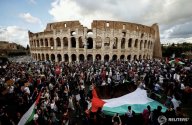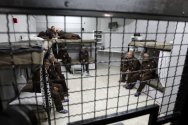Article 3
In the case of armed conflict not of an international character occurring in the territory of one of the High Contracting Parties, each Party to the conflict shall be bound to apply, as a minimum, the following provisions:
1. Persons taking no active part in the hostilities, including members of armed forces who have laid down their arms and those placed hors de combat by sickness, wounds, detention, or any other cause, shall in all circumstances be treated humanely, without any adverse distinction founded on race, colour, religion or faith, sex, birth or wealth, or any other similar criteria.
To this end, the following acts are and shall remain prohibited at any time and in any place whatsoever with respect to the above-mentioned persons:
(a) Violence to life and person, in particular murder of all kinds, mutilation, cruel treatment and torture;
(b) Taking of hostages;
(c) Outrages upon personal dignity, in particular humiliating and degrading treatment;
(d) The passing of sentences and the carrying out of executions without previous judgment pronounced by a regularly constituted court, affording all the judicial guarantees which are recognized as indispensable by civilized peoples.
Article 18
Civilian hospitals shall be marked by means of the emblem provided for in Article 38 of the Geneva Convention for the Amelioration of the Condition of the Wounded and Sick in Armed Forces in the Field of August 12, 1949, but only if so authorized by the State.
The Parties to the conflict shall, in so far as military considerations permit, take the necessary steps to make the distinctive emblems indicating civilian hospitals clearly visible to the enemy land, air and naval forces in order to obviate the possibility of any hostile action.
In view of the dangers to which hospitals may be exposed by being close to military objectives, it is recommended that such hospitals be situated as far as possible from such objectives.
Article 28
The presence of a protected person may not be used to render certain points or areas immune from military operations.
Article 29
The Party to the conflict
in whose hands protected persons may be is responsible for the treatment accorded to them by its agents, irrespective of any individual responsibility which may be incurred.
Article 34
The taking of hostages is prohibited.
Article 35
All protected persons who may desire to leave the territory at the outset of, or during a conflict, shall be entitled to do so, unless their departure is contrary to the national interests of the State.
Article 49
Individual or mass forcible transfers, as well as deportations of protected persons from occupied territory to the territory of the Occupying Power or to that of any other country, occupied or not, are prohibited, regardless of their motive.
Article 53
Any destruction by the Occupying Power of real or personal property belonging individually or collectively to private persons, or to the State, or to other public authorities, or to social or cooperative organizations, is prohibited, except where such destruction is rendered absolutely necessary by military operations.
Article 147
Grave breaches to which the preceding Article relates shall be those involving any of the following acts, if committed against persons or property protected by the present Convention: wilful killing, torture or inhuman treatment, including biological experiments, wilfully causing great suffering or serious injury to body or health, unlawful deportation or transfer or unlawful confinement of a protected person, compelling a protected person to serve in the forces of a hostile Power, or wilfully depriving a protected person of the rights of fair and regular trial prescribed in the present Convention, taking of hostages and extensive destruction and appropriation of property, not justified by military necessity and carried out unlawfully and wantonly.
ANNEX 1
Article 2
No persons residing, in whatever capacity, in a hospital and safety zone shall perform any work, either within or without the zone, directly connected with military operations or the production of war material.
Article 3
The Power establishing a hospital and safety zone shall take all necessary measures to prohibit access to all persons who have no right of residence or entry therein.
Article 4
Hospital and safety zones shall fulfil the following conditions:
(a) They shall comprise only a small part of the territory governed by the Power which has established them.
(b) They shall be thinly populated in relation to the possibilities of accommodation.
(c) They shall be far removed and free from all military objectives, or large industrial or administrative establishments.
(d) They shall not be situated in areas which, according to every probability, may become important for the conduct of the war.
Article 5
Hospital and safety zones shall be subject to the following obligations:
(a) The lines of communication and means of transport which they possess shall not be used for the transport of military personnel or material, even in transit.
(b) They shall in no case be defended by military means.
Article 6
Hospital and safety zones shall be marked by means of oblique red bands on a white ground, placed on the buildings and outer precincts.
Zones reserved exclusively for the wounded and sick may be marked by means of the Red Cross (Red Crescent, Red Lion and Sun) emblem on a white ground.
They may be similarly marked at night by means of appropriate illumination.
Article 7
The Powers shall communicate to all the High Contracting Parties in peacetime or on the outbreak of hostilities, a list of the hospital and safety zones in the territories governed by them. They shall also give notice of any new zones set up during hostilities.
As soon as the adverse Party has received the above-mentioned notification, the zone shall be regularly established.
If, however, the adverse Party considers that the conditions of the present agreement have not been fulfilled, it may refuse to recognize the zone by giving immediate notice thereof to the Party responsible for the said zone, or may make its recognition of such zone dependent upon the institution of the control provided for in Article 8.










